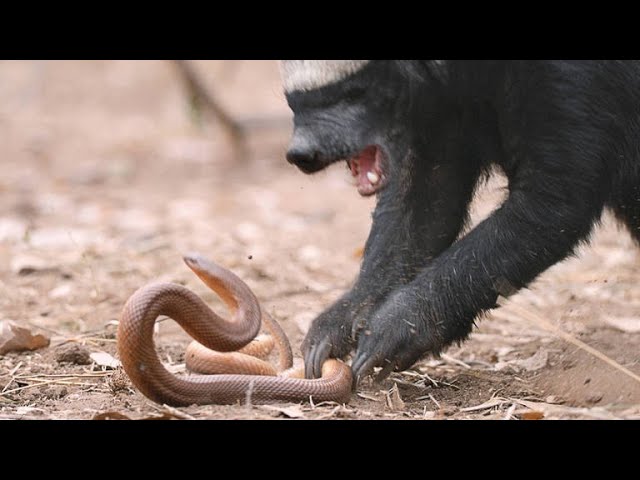A confrontation between a honey badger and a black mamba, one of the most venomous snakes in the world, would be an intense battle. In combat, a honey badger would defeat a black mamba. Honey badgers are quick and can dodge the black mamba’s assaults. When the fight begins, both animals will attempt to strike lethal blows. They are quite aggressive.
Overall, the honey badger has a better probability than black mamba. When they fight, both creatures are extremely aggressive and aim for the deadly blow. However, honey badgers have excellent agility, speed, and mobility, and they may readily dodge black mamba attacks by manipulation.
Honey badgers battle with a free mind, initially making a number of motions around the snake to distract it, and when black mambas lose interest, honey badgers attack them on the head.
Furthermore, honey badgers are very resistant to snake poison. If they are stung by a snake, they will temporarily lose consciousness. The snake will undoubtedly try to assault them again, but the honey badger must regain awareness and respond furiously to the snake.
Otherwise, they may be killed by their poisonous attacks. It is usual practice for honey badgers to emerge from their caves and quickly dispatch the black mamba. Snakes are usually killed by a single stroke from a honey badger when they deliver their last blow.
As a result, we infer that honey badgers don’t give a damn and can confront or kill even the most dangerous animals on the planet.
They could even withstand highly poisonous assaults from lethal snakes.
Both animals are highly skilled and possess unique adaptations. Here’s an overview:
- Honey Badger’s Fearlessness: Honey badgers are renowned for their fearless nature and their ability to confront venomous snakes. They exhibit little hesitation when facing dangerous opponents like the black mamba.
- Black Mamba’s Venom: Black mambas are extremely venomous and possess potent neurotoxic venom. A single bite from a black mamba can be lethal to many animals, including humans. Their venom attacks the nervous system, causing paralysis and respiratory failure if left untreated.
- Honey Badger’s Defense Tactics: When faced with a black mamba, a honey badger would likely employ its defensive strategies. It may stand its ground, display aggressive behavior, hiss, growl, and attempt to immobilize the snake by biting it, targeting the head or sensitive areas.
- Resistance to Venom: Honey badgers have a degree of resistance to snake venom, including neurotoxic venom like that of the black mamba. While they are not entirely immune, they can endure snake bites to some extent without succumbing to the venom’s effects immediately.
- Experience and Skill: Honey badgers have evolved to become adept snake hunters. They possess the knowledge, experience, and physical attributes to locate, capture, and kill snakes effectively. They are skilled at identifying a snake’s weaknesses and exploiting them.
In a direct confrontation, the honey badger’s fearlessness, defensive tactics, and resistance to venom give it a significant advantage. However, it’s important to note that a black mamba’s bite is extremely dangerous, and even with the honey badger’s defenses, it could potentially deliver a lethal dose of venom.
While honey badgers have been observed successfully neutralizing venomous snakes, including black mambas, the outcome of such a battle would depend on several factors, including the size and species of the black mamba, the specific individuals involved, and the element of surprise.
It’s worth emphasizing that in the wild, honey badgers typically avoid unnecessary confrontations with venomous snakes and will only engage when provoked or threatened. Their primary objective is self-defense, and they prioritize survival rather than engaging in unnecessary battles.
![]()


Comments